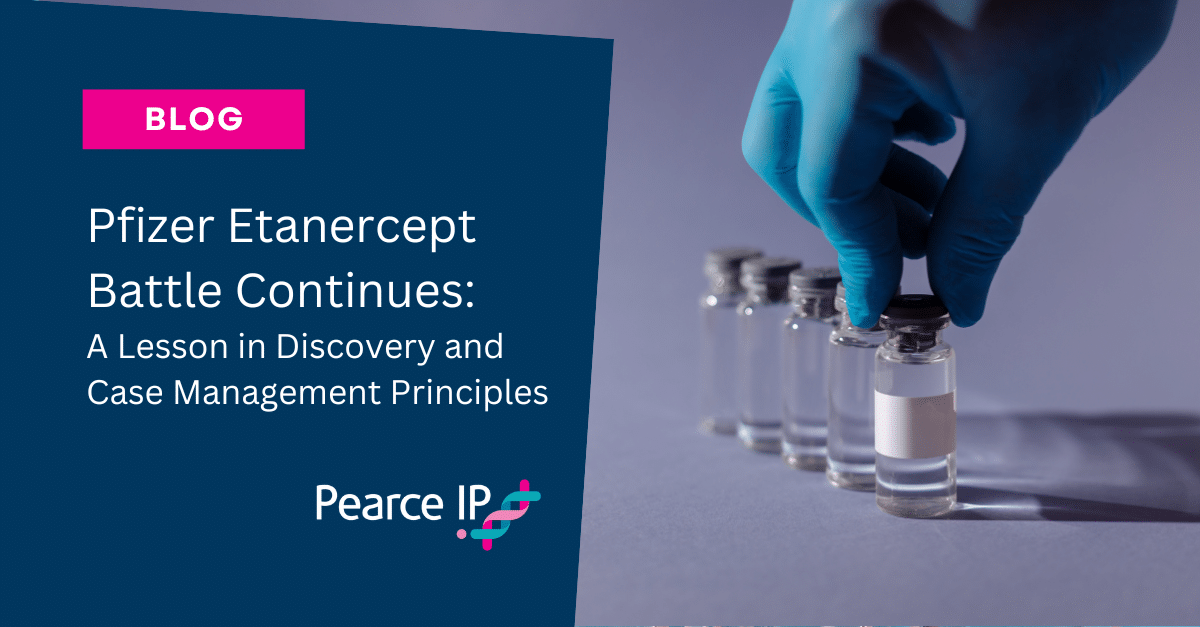| Date of decision: | 18 June 2024 |
| Body: | Federal Court |
| Adjudicator: | Justice Burley |
Highlight
On 18 June 2024, Justice Burley delivered a decision regarding documentary discovery in the long running dispute between Pfizer (Pfizer Ireland Pharmaceuticals and Pfizer Australia) and four of its competitors over AU2005280034 for the “Production of polypeptides” (the Pfizer Patent). Justice Burley’s decision illustrates clearly the Federal Court’s strict approach to confining discovery only to the production of documents that are directly relevant to the issues in dispute. Following this strict approach, his Honour declined to order discovery of Pfizer’s research & development documents, warning that the relevance of the patentee’s research & development documents to a lack of inventive step ground will vary from case to case. His Honour did however order the production of documents in a second category given its direct relevance to the pleaded lack of best method case. His Honour also took the opportunity to comment on the parties’ case management, criticising what he described as the “poorly focussed, scattergun approach” to lack of inventive step, and requiring the parties to reduce the scope of the currently pleaded case which at the time of Justice Burley’s decision involved over 80 combinations of common general knowledge and prior art documents.
Background
In the proceedings, Pfizer has alleged that Organon (Organon LLC and Organon Pharma), Samsung Bioepis (Samsung Bioepis Co. Ltd and Samsung Bioepis Australia), MSD (Merck Sharp Dohme Corp and Merck Sharp Dohme Australia) and two Arrow companies (the Respondents) infringe the Pfizer Patent in their manufacture of etanercept, a biologic used in the treatment of autoimmune diseases. Pfizer manufactures and sells etanercept under the brand name ENBREL®. The Respondents have cross-claimed alleging that the Pfizer Patent is invalid on numerous grounds including want of novelty, lack of inventive step, inutility and failure to disclose the best method.
The proceedings are not far advanced, despite Pfizer commencing the proceedings in May 2022. Pleadings have closed but no affidavit evidence has been filed. Affidavit evidence in chief is due to be filed in December 2024, with answer affidavit evidence due in April 2025. The proceeding has then been listed for a three week hearing in September to October 2025.
Key Issues
In advance of filing any affidavit evidence, the Respondents sought discovery in two categories, summarised as follows:
- Category One: documents recording the research and development on the claimed invention between August 2002 and August 2004. The Respondents argued that Category One documents were relevant to both the lack of inventive step and inutility grounds.
- Category Two: all documents created or dated before the filing date of the patent concerning the production of etanercept or “TNFR-Ig” as described in Example 16 of the Pfizer Patent. The Respondents argued that Category Two documents were relevant to the lack of best method ground.
Outcome
Category One
Justice Burley did not order discovery in Category One for two key reasons.
First, the Federal Court Rules require that documents be “directly relevant to the issues raised by the pleadings or in the affidavits” to be discoverable. Lack of inventive step is an objective test which requires the Court to consider whether a person skilled in the art would have found the invention to be obvious “…which is a remove from the steps taken by the inventors themselves”. So, the patentee’s research and development documents, while relevant to the question of inventive step, are of secondary significance only. The Respondents’ inventive step pleading emphasised the secondary significance of the research and development documents, giving “no inkling that [the inventor’s own path to the invention was] relevant at all”.
Second, section 37M of the Federal Court of Australia Act 1976 (Cth) “requires the court to be astute to the quick, inexpensive, and efficient disposition of cases”. The Judge considered that the Category One documents could be viewed as “an exercise in fishing”. While there was no evidence that discovery of these documents would be oppressive, additional work would be required by Pfizer to locate and produce the documents, by the Respondents to review and assess the documents and by the Court, all of which would add to the cost of the proceedings.
Justice Burley also did not consider that the inutility ground supported discovery of Category One documents. His Honour, however, indicated that he would order Category One discovery if Pfizer ultimately file affidavit evidence from the inventors.
In considering the Category One discovery, Justice Burley made some initial observations on the Respondents’ lack of inventive step case which relies on the common general knowledge considered alone or alternatively in combination with multiple prior art documents considered separately or in combination. The combinations and permutations of the prior art add up to over 80 variations of common general knowledge and prior art documents. Justice Burley expressed his dissatisfaction with the Respondents’ approach on inventive step, noting that “[g]iven the number of permutations and items of prior art pleaded, it may be said that the lack of inventive step case takes something of a poorly focussed, scattergun approach”. In response, the Respondents have undertaken to streamline their lack of inventive step case in the coming months.
Category Two
Justice Burley ordered discovery in Category Two (in a slightly amended and narrower form than sought by the Respondents) as the category is directly relevant to the Respondents’ lack of best method pleading. The Respondents expressly plead that the best method is set out in Example 16, but that Example 16 omits certain information which may be inferred to be known to the patent applicant at the time of filing the patent application. His Honour also considered that the Respondent’s pleaded case was to some extent supported by the evidence of Dr Denis Drapeau, one of the co-inventors, whose declaration was annexed to an affidavit filed by Pfizer in response to the Respondents’ discovery application.
Implications
Justice Burley’s decision is a timely reminder of the Federal Court’s strict approach on discovery applications. Discovery will only be ordered for documents directly relevant to the issues in dispute.
His Honour’s decision is also a timely reminder that the Court seeks to conduct proceedings in accordance with section 37M of the Federal Court of Australia Act 1976 (Cth) which “…requires the court to be astute to the quick, inexpensive, and efficient disposition of cases”. The Court looks to the parties to run cases in as streamlined and as cost-effective manner as possible. His Honour took the opportunity to comment on the parties’ case management, criticising what he described as the “poorly focussed, scattergun approach” to lack of inventive step, and requiring the parties to reduce the scope of the currently pleaded inventive step case.
About Pearce IP
Pearce IP is a specialist, life-sciences focussed, intellectual property/law firm offering lawyers and attorneys in Australia and New Zealand.
In 2025, Pearce IP was honoured by Australasian Lawyer and New Zealand Lawyer as a Top Specialist Firm, 5 Star Employer of Choice, and the “Standout Winner” for Inclusion and Culture (<100 employees). Pearce IP and its leaders are ranked in every notable legal directory including: Chambers & Partners, Legal 500, IAM Patent 1000, IAM Strategy 300, MIP IP Stars, Doyles Guide, WTR 1000, Best Lawyers, WIPR Leaders, Best Law Firms, among others.
Pearce IP is the only leading IP firm in Australia and New Zealand with a female founder, and is certified by WEConnect International as women owned.

Naomi Pearce
CEO, Executive Lawyer (AU, NZ), Patent Attorney (AU, NZ) & Trade Mark Attorney (AU)
Naomi is the founder of Pearce IP, and is one of Australia’s leading IP practitioners. Naomi is a market leading, strategic, commercially astute, patent lawyer, patent attorney and trade mark attorney, with over 25 years’ experience, and a background in molecular biology/biochemistry. Ranked in virtually every notable legal directory, highly regarded by peers and clients, with a background in molecular biology, Naomi is renowned for her successful and elegant IP/legal strategies.
Among other awards, Naomi is ranked in Chambers, IAM Patent 1000, IAM Strategy 300, is a MIP “Patent Star”, and is recognised as a WIPR Leader for patents and trade marks. Naomi is the 2023 Lawyers Weekly “IP Partner of the Year”, the Lexology Client Choice Award recipient in 2022 and 2026, the 2022 Asia Pacific Women in Business Law “Patent Lawyer of the Year” and the 2024 Lawyers Weekly Women in Law “Executive of the Year”. Naomi is the founder of Pearce IP, which commenced in 2017 and won 2021 “IP Team of the Year” at the Australian Law Awards.

Helen Macpherson
Executive, Lawyer (Head of Litigation –Australia)
Helen is a highly regarded intellectual property specialist and industry leader with more than 25 years’ experience advising on patents, plant breeder’s rights, trade marks, copyright and confidential information. She is known for her expertise in complex, high-value patent matters and leverages her technical background in biochemistry and molecular biology to work across a wide range of technologies, including inorganic, organic, physical and process chemistry, biochemistry, biotechnology (including genetics, molecular biology and virology), and physics. Helen is an active member of the Intellectual Property Committee of the Law Council of Australia and the Intellectual Property Society of Australia and New Zealand.

